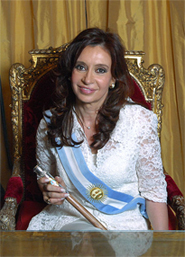President Fernndez

Cristina Fernndez de Kirchner.
Courtesy Presidencia de la Nacin Argentina
Yet Nstor Kirchner retained a great deal of authority in the new administration; major decisions were seen as coming from him, and he was widely expected to run for the presidency again at the conclusion of his wifes term in 2011. Argentine presidents were restricted to two consecutive terms in office but could run again after a term out of power. Some suspected the Kirchners intended to trade the presidency between them for many terms to come.
[1]
Fernndez herself enjoyed high popularity for about three months after her January 2008 inauguration. That began to change on
The tax hike antagonized
It was during this period that the relationship between Clarn and the Kirchners soured. Nstor Kirchner later claimed on state television that Clarn CEO Magnetto had approached him during the farm crisis to offer positive coverage of the government if Kirchner agreed to help Clarn acquire
Listen to reporter Fiona Ortiz discuss Kirchner's war on business.
Clarn
newspaper responded with blistering editorials; its news pages, meanwhile, featured ever more frequent investigations into government corruption and ever more critical coverage of the farm crisis. When Congress, dominated by the Kirchners own party, repealed the farm tax on
[1]
Larry Rohter,
Argentinas President Steps Aside to Support His Wife as Successor,
New York Times
, July 3, 2007.
[2]
Shane Romig,
Argentina Ex-President: Clarn Offered Spin For Telephone Co,
Dow Jones Newswires, January 25, 2010.
[3]
Charles Newbery,